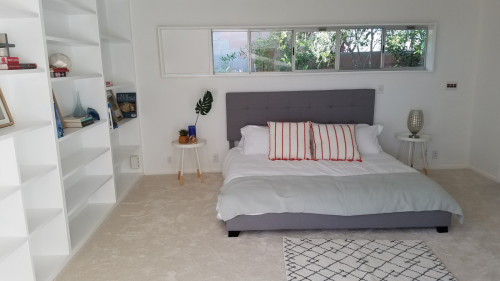






The Bel Air Home
Verified Center
This provider's information has been quality-checked by Recovery.com's Research Team for accuracy and completeness, including center verification through appropriate third-party organizations.
Treatment Focus
At this center, you receive personalized care for mental health conditions. They provide therapy and tailor treatment to your unique needs, diagnoses, and preferences.
Primary Level of Care
Offering intensive care with 24/7 monitoring, residential treatment is typically 30 days and can cover multiple levels of care. Length can range from 14 to 90 days typically.
Treatment Focus
At this center, you receive personalized care for mental health conditions. They provide therapy and tailor treatment to your unique needs, diagnoses, and preferences.
Primary Level of Care
Offering intensive care with 24/7 monitoring, residential treatment is typically 30 days and can cover multiple levels of care. Length can range from 14 to 90 days typically.
Provider's Policy
The Bel Air Home accepts most major PPO health insurance plans on an in-network basis.
The Bel Air Home
The Bel Air Home
About The Bel Air Home
Bel Air Home heals the mind and solves mental health problems where other programs have failed. They serve clients in crisis and those in need of intensive mental health treatment for complex disorders such as major depression, anxiety, bipolar disorder, schizophrenia/schizoaffective disorder and trauma. From their peaceful residence in the beautiful and luxurious hills of Bel Air, they combine advanced therapeutics such as TMS and ketamine treatment with the highest degree of personalized care available. Serving only a very few inpatient clients at a time, their medical director personally oversees each case to ensure the best care possible.
Choose Intensive Support for Lasting Change
During the average 21 to 30 day stay, Bel Air Home makes sure each patient has the tools needed to manage their mental health diagnosis in everyday life once treatment is completed. Their robust medical team includes a psychiatrist, pain management expert, neurologist, internist, addiction medicine expert and psychologists who collaborate on every case. Though medication management is intensive, they also like to minimize medications as much as possible. They recognize that medical and pain issues can affect mental wellness, which is why their doctors also treat chronic pain and complicated medical problems. Their program is flexible for those who need extra support and a slower pace. Each client is given multiple hours of group and individual therapy every day of the week by expert clinicians. Clients see a physician 3-4 times per week. The center integrates holistic methods to complement traditional treatments, including yoga, acupuncture, meditation, and art therapy. They also offer nutrition counseling, medical lab testing, and optional ketamine and transcranial magnetic stimulation (TMS) treatments.
Reach a Better Outcome with a Correct Diagnosis
Clients leave Bel Air Home functioning at a much higher level, thanks to a comprehensive assessment that ensures precise, personalized care. The intake process includes an in-depth review of medical history, previous treatments, and current symptoms, alongside psychological evaluations and advanced diagnostics. This approach enables the clinical team to fully understand each client’s unique mental health needs. Many clients arrive on complex medication regimens, and through careful assessment, clinicians identify essential medications while minimizing those causing side effects. For those transitioning from a psychiatric hospitalization, Bel Air Home provides an important place to continue that mental health care.
Continue Making Progress After Treatment
Bel Air Home is committed to helping each client achieve lasting mental health recovery beyond their 3-4 weeks of treatment. Clients are provided multiple options for ongoing support including intensive outpatient treatment (PHP/IOP) or private therapists and psychiatrists near their homes for ongoing support.
Heal in a Discreet, Tranquil Neighborhood
Bel Air Home is nestled in one of the most exclusive neighborhoods in the U.S., offering an ideal setting for mental health treatment with its sense of privacy and serenity. The residence combines upscale comfort and offers various living options, including private and shared rooms. Communal spaces, like the patio and living room, are designed for group therapy sessions, yoga, and social gatherings. Therapists have dedicated, comfortable offices within the home, enhancing the convenience of care. Amenities include staff-prepared meals, a pool, and access to local fitness facilities. Clients enjoy regular outings to botanical and sculpture gardens, museums, and scenic hikes.
Highlights from the Center
Highlights
These highlights are provided by and paid for by the center.
Holistic Approach
Utmost Confidentiality
Doctor Level Therapists
Center Overview
Treatment Focus
At this center, you receive personalized care for mental health conditions. They provide therapy and tailor treatment to your unique needs, diagnoses, and preferences.
Joint Commission Accredited
The Joint Commission accreditation is a voluntary, objective process that evaluates and accredits healthcare organizations (like treatment centers) based on performance standards designed to improve quality and safety for patients. To be accredited means the treatment center has been found to meet the Commission's standards for quality and safety in patient care.
Insurance Accepted
Cash Pay Rates
Estimated Cash Pay Rate
Center pricing can vary based on program and length of stay. Contact the center for more information. Recovery.com strives for price transparency so you can make an informed decision.




Levels of Care





Your Care Options
Specializations
Schizophrenia
Schizophrenia is a serious mental health condition that causes hallucinations, delusions, and disordered thinking.
Personality Disorders
Personality disorders destabilize the way a person thinks, feels, and behaves. If untreated, they can undermine relationships and lead to severe distress.
Chronic Pain Management
Long-term physical pain can have an affect on mental health. Without support, it can also impact your daily life and even lead to addiction.
Post Traumatic Stress Disorder
PTSD is a long-term mental health issue caused by a disturbing event or events. Symptoms include anxiety, dissociation, flashbacks, and intrusive thoughts.
Suicidality
With suicidality, a person fantasizes about suicide, or makes a plan to carry it out. This is a serious mental health symptom.
Ketamine Therapy
Ketamine therapy uses ketamine, a dissociative anesthetic, to provide rapid relief for severe depression, trauma symptoms, and other mental health conditions.
Who We Treat
Older Adults
Addiction and mental health treatment caters to adults 55+ and the age-specific challenges that can come with recovery, wellness, and overall happiness.
Executives
Executive treatment programs typically directly support the needs of people who manage businesses and may provide flexible schedules and office space to allow work during treatment.
LGBTQ+
Addiction and mental illnesses in the LGBTQ+ community must be treated with an affirming, safe, and relevant approach, which many centers provide.
Men and Women
Men and women attend treatment for addiction in a co-ed setting, going to therapy groups together to share experiences, struggles, and successes.
Midlife Adults
For adults ages 40+, treatment shifts to focus on the unique challenges, blocks, and risk factors of their age group, and unites peers in a similar community.
Mild Disabilities
Adults with mild physical or intellectual disabilities receive treatment catered to their specific needs in a safe and clinically supportive environment.
Approaches
Evidence-Based
A combination of scientifically rooted therapies and treatments make up evidence-based care, defined by their measured and proven results.
Holistic
A non-medicinal, wellness-focused approach that aims to align the mind, body, and spirit for deep and lasting healing.
Individual Treatment
Individual care meets the needs of each patient, using personalized treatment to provide them the most relevant care and greatest chance of success.
Medical
Medical addiction treatment uses approved medications to manage withdrawals and cravings, and to treat contributing mental health conditions.
Personalized Treatment
The specific needs, histories, and conditions of individual patients receive personalized, highly relevant care throughout their recovery journey.
Therapies
1-on-1 Counseling
Patient and therapist meet 1-on-1 to work through difficult emotions and behavioral challenges in a personal, private setting.
Meditation & Mindfulness
A practiced state of mind that brings patients to the present. It allows them to become fully aware of themselves, their feelings, and the present moment.
Transcranial Magnetic Stimulation
Localized magnetic pulses stimulate areas of the brain to increase brain activity and reduce abnormal functions.
Art Therapy
Visual art invites patients to examine the emotions within their work, focusing on the process of creativity and its gentle therapeutic power.
Couples Counseling
Partners work to improve their communication patterns, using advice from their therapist to better their relationship and make healthy changes.
Eye Movement Therapy (EMDR)
Lateral, guided eye movements help reduce the emotional reactions of retelling and reprocessing trauma, allowing intense feelings to dissipate.
Conditions We Treat
Schizophrenia
Schizophrenia is a serious mental health condition that causes hallucinations, delusions, and disordered thinking.
Grief and Loss
Grief is a natural reaction to loss, but severe grief can interfere with your ability to function. You can get treatment for this condition.
Personality Disorders
Personality disorders destabilize the way a person thinks, feels, and behaves. If untreated, they can undermine relationships and lead to severe distress.
ADHD, ADD
ADHD is a common mental health condition caused by dopamine imbalance. Common symptoms include inattention, hyperactivitiy, and impulsivity.
Anger
Although anger itself isn't a disorder, it can get out of hand. If this feeling interferes with your relationships and daily functioning, treatment can help.
Anxiety
Anxiety is a common mental health condition that can include excessive worry, panic attacks, physical tension, and increased blood pressure.
Bipolar
This mental health condition is characterized by extreme mood swings between depression, mania, and remission.
Substances We Treat
Alcohol
Using alcohol as a coping mechanism, or drinking excessively throughout the week, signals an alcohol use disorder.
Benzodiazepines
Benzodiazepines are prescribed to treat anxiety and sleep issues. They are highly habit forming, and their abuse can cause mood changes and poor judgement.
Languages
Aftercare
Care Designed for Your Needs
Personal Amenities
Amenities
Special Considerations
Clients can bring their own pet(s)
For greater comfort and healing, pet-friendly treatment centers welcome dogs and animal companions to stay with their owners while they attend treatment.
Couples program
Using gentle clinical care, therapists guide patients and their partner through guided sessions to address issues and work towards lasting solutions.
Pet Friendly
For greater comfort and healing, pet-friendly treatment centers welcome dogs and animal companions to stay with their owners while they attend treatment.
Flexible technology policies
Centers with flexible technology policies allow professionals to stay in touch with work and give patients a greater sense of connection and normalcy.
Healthy Meals are provided
Great food meets great treatment, with providers serving healthy meals to restore nutrition, wellbeing, and health.
Religion-Based Track
Patients can join faith-based recovery tracks to approach recovery with others in their faith, healing in a like-minded group with similar goals.
Activities
Yoga
Yoga is both a physical and spiritual practice. It includes a flow of movement, breathing techniques, and meditation.






